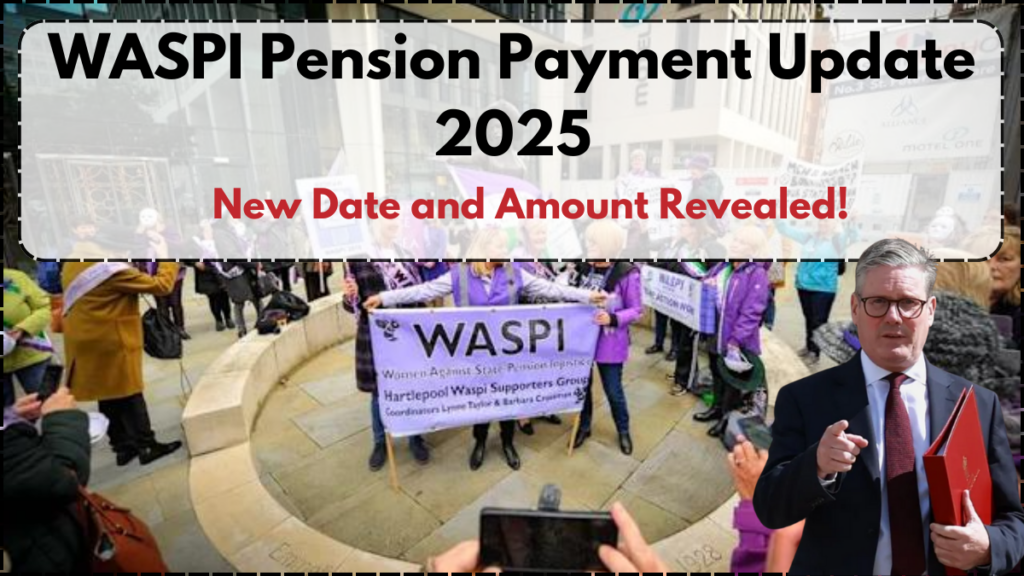As of April 2025, the Women Against State Pension Inequality (WASPI) movement remains a significant and unresolved social issue in the UK. It revolves around women born between April 6, 1950, and April 5, 1960, who faced abrupt increases to their State Pension Age (SPA) without adequate notice. Despite a long campaign and findings from the Parliamentary and Health Service Ombudsman (PHSO) supporting their claims, the UK government has officially refused to offer financial compensation.
The matter has ignited renewed debate in Parliament and beyond, as campaigners and legal advocates continue to fight for justice. This update covers the current pension situation, government response, compensation recommendations, and practical steps for affected individuals.

Understanding the WASPI Campaign
WASPI stands for Women Against State Pension Inequality. These women were affected by the changes introduced under the Pensions Act 1995 and accelerated by the Pensions Act 2011. The legislation aimed to equalize the SPA between men and women, gradually increasing it to 66.
The controversy is not about the equalization itself but the inadequate communication. Thousands of women were either not informed or informed far too late, disrupting financial planning, retirement plans, and in many cases, leading to economic hardship.
April 2025 Update: Ombudsman’s Report & Government Decision
In March 2025, the PHSO finalized its investigation, concluding that the Department for Work and Pensions (DWP) committed “maladministration” by failing to properly inform women of the changes. The Ombudsman recommended compensation between £1,000 and £2,950 per person to acknowledge the distress and disruption caused.
However, in April 2025, the UK government under Prime Minister Keir Starmer declined to implement these recommendations. Officials cited fiscal limitations, arguing that compensating the 3.5 million affected women would cost the Treasury an estimated £3.5 billion to £10.5 billion. The decision sparked backlash from advocacy groups, opposition MPs, and the public.
Key Facts and Figures
| Topic | Details |
|---|---|
| Affected Group | Women born April 6, 1950 – April 5, 1960 |
| Latest Compensation Status | Denied by the UK Government |
| Ombudsman Recommendation | £1,000 – £2,950 per individual |
| Estimated Total Compensation | £3.5 billion – £10.5 billion |
| Basic State Pension (2025) | £176.45/week |
| New Full State Pension (2025) | £221.20/week |
| Official Sources | GOV.UK, PHSO, WASPI.co.uk |
Why It Still Matters in 2025
This issue affects approximately 3.5 million women across the UK. Many had planned for retirement at 60 but had to work longer or rely on savings and benefits due to last-minute changes. The absence of compensation has compounded their financial insecurity and led to widespread dissatisfaction.
Beyond money, the situation speaks to broader concerns about public trust, transparency, and governmental accountability. Citizens expect timely and accurate information on policy shifts, particularly those impacting life milestones such as retirement.
Your State Pension Rates in 2025
State Pension amounts for 2025 have been adjusted under the Triple Lock system, which ensures pensions rise annually based on the highest of earnings growth, inflation, or 2.5%:
- New State Pension (for those retiring post-April 6, 2016): £221.20/week
- Basic State Pension (for those retiring before April 6, 2016): £176.45/week
Eligible individuals may also apply for Pension Credit and other financial support programs. Use the State Pension Forecast Tool on GOV.UK to check your personal entitlement.
What WASPI Women Can Do in 2025
While the government has rejected compensation, the campaign continues. Here are constructive steps to consider:
- Engage with the WASPI Movement: Regularly visit waspi.co.uk for legal updates, public campaigns, and community support.
- Follow PHSO Updates: Monitor ombudsman.org.uk for any further actions or case reviews.
- Seek Financial Advice: Services like Pension Wise and Citizens Advice offer free guidance on maximizing your retirement income.
- Explore Legal Recourse: Legal professionals are investigating a judicial review. Stay informed or consider participating.
- Speak to Your MP: Public pressure influences political action. Contact your local representative to express your views and demand support.
Legal and Political Momentum
Efforts to hold the government accountable have not ceased.
- Judicial Review Filed: Legal proceedings are underway to challenge the government’s rejection.
- Cross-Party Support in Parliament: MPs from multiple parties have condemned the decision and are pushing for legislative reassessment.
- Public Ethics Debate: The failure to inform women of major life-impacting changes continues to be viewed as a breach of trust, raising serious questions about democratic responsibility.
Conclusion
The WASPI pension issue remains a pressing concern in April 2025. Despite official acknowledgment of maladministration, the government’s refusal to provide compensation has intensified public and legal scrutiny. While the path to justice may be long, collective action, legal advocacy, and political pressure remain powerful tools. WASPI women deserve recognition not only for the financial loss but also for the emotional and societal impact of a poorly managed transition.
FAQs
What does WASPI stand for?
WASPI means Women Against State Pension Inequality. It represents women born between 1950 and 1960 who faced pension age changes without fair notice.
Why were pension ages changed?
The changes were introduced to equalize pension ages between men and women, gradually raising the State Pension Age to 66.
Why was compensation denied in 2025?
The UK government cited the high cost to taxpayers as the main reason for rejecting the Ombudsman’s compensation recommendation.
How many women are affected?
An estimated 3.5 million women across the UK have been impacted by these changes.
Can the decision be reversed?
There is a possibility. Ongoing legal actions, including a judicial review, could lead to policy reconsideration or new compensation schemes.
For More Information Click Here
Pari is a passionate writer known for captivating stories that blend imagination and reality. Inspired by travel, history, and everyday moments, Pari crafts narratives that resonate deeply with readers.




